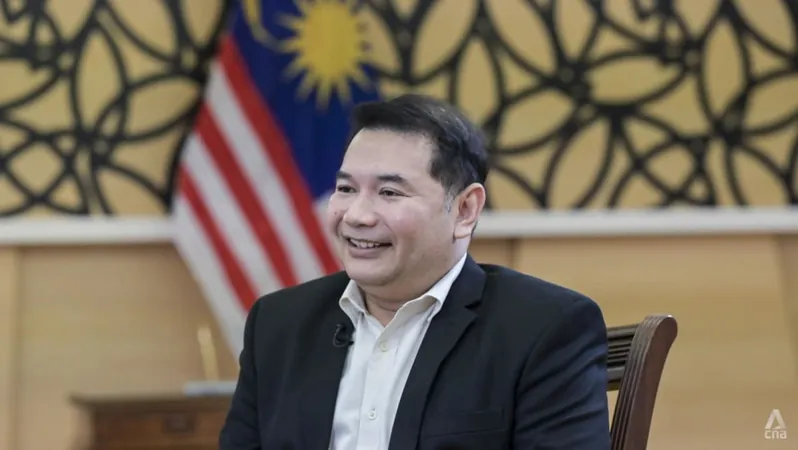
A Bold Future: Minister Rafizi Ramli Discusses the Johor-Singapore Special Economic Zone
2025-01-09
Author: Yu
The economies of Johor, Malaysia, and Singapore have always thrived on their close interdependence. With many Singaporean enterprises operating in Johor, the formalization of a Special Economic Zone (SEZ) between the two regions is a significant leap toward enhancing this relationship. In an exclusive interview, Malaysian Economy Minister Rafizi Ramli outlines the motivations and ambitious goals of this initiative.
Q: Why formalize the Johor-Singapore collaboration into a Special Economic Zone now?
Rafizi Ramli: We stand at a pivotal moment in history where we can collaboratively market Johor and Singapore as premier global investment destinations. Singapore has successfully attracted investments that have transformed its own landscape, while Johor has historically relied on investments to bolster its economy. However, to elevate our economic progression to high-value, high-tech industries, both regions face challenges that hinder further advancement.
Our joint efforts create a synergy that surpasses what either Johor or Singapore could achieve alone, especially in the context of the shifting global economic landscape. Many multinational corporations are scouting for strategic locations that can help them navigate trade wars, and our SEZ offers an attractive proposal—accessing Johor's resources and Singapore's sophisticated infrastructure.
Q: How does the Special Economic Zone fit into the broader ambitions of the Madani government?
Rafizi Ramli: The primary aim is to elevate Malaysia into a high-income nation by around 2028 or 2029. Achieving this goal necessitates a significant economic restructuring—from a commodities-oriented system to one that emphasizes value creation and innovation. Johor is poised to be a cornerstone for this growth, particularly through partnerships with Singapore, leveraging existing strengths to attract high-tech investments.
Q: Why adopt a multi-sectoral approach for the SEZ instead of targeting specific industries?
Rafizi Ramli: We recognize ASEAN's potential to become one of the world's largest economies in the next decade. By embracing a broad-spectrum approach—targeting not just manufacturing but also sectors like R&D and energy—we are better positioned to attract a diverse range of investors. This flexibility allows us to capitalize on investors’ interests across different industries rather than limiting ourselves to a few sectors.
Q: What incentives exist for investors in this framework?
Rafizi Ramli: The main draw is the potential for synergy between Singapore and Johor. We are focused on streamlining the movement of goods and people and harmonizing processes to create a conducive environment for business. While traditional fiscal incentives are essential, the priority is on building a robust infrastructure that can support these investments right from the start. Malaysia is committed to fast-tracking infrastructure development to prevent the typical bottlenecks that concern investors.
Q: Given Johor's reliance on Singapore, how do you plan to attract global companies?
Rafizi Ramli: It would be shortsighted to limit our vision to just Singapore and Malaysia. JS-SEZ is designed to be an attractive option for global investors looking to expand within ASEAN. The unique proposition we offer—synergies that combine the best of both worlds—positions us favorably against other regional options like Vietnam or Indonesia.
Q: What does it take for the JS-SEZ to compete with established zones globally?
Rafizi Ramli: While there are inherent differences in our cross-border SEZ setup, I believe our collaboration signals an ambitious step toward ASEAN's integration. Aligning economic efforts between two countries not only strengthens our respective markets but can also serve as a blueprint for future regional collaborations. Successful implementation will establish a precedent for further economic integration in ASEAN.
Q: What are the next immediate steps in realizing this vision?
Rafizi Ramli: We will initiate a series of work streams that will involve a high-level committee to create a comprehensive roadmap for the SEZ. The foundational principles are now established, enabling us to move forward with developing a blueprint. Concurrently, Malaysia’s Iskandar Malaysia Facilitation Centre is ready to expedite bureaucratic processes for faster investment approvals.
Q: How will you ensure the long-term viability of the SEZ amid changing political conditions?
Rafizi Ramli: The longevity of the JS-SEZ relies on its inherent commercial value rather than on individual leaders or administrations. Demonstrating the economic potential through the successful launch of 50 projects within the first five years is vital. If we can show tangible results from these initial projects, investor confidence will solidify.
Q: What is your broader vision for the JS-SEZ in the next decade and beyond?
Rafizi Ramli: I envision the JS-SEZ transcending geographical limitations, establishing itself as a global hub for innovation and technological advancement. In 10 to 15 years, as ASEAN evolves into a dynamic consumer market, I believe the SEZ will play a critical role in servicing this burgeoning economy, catering not only to regional demands but also contributing significantly to global markets.
This transformational initiative represents not just an economic milestone for Johor and Singapore, but also a bold step toward regional collaboration in the ASEAN community. Investors and businesses worldwide should keep a keen eye on the unfolding developments as the JS-SEZ promises to be a game-changer in the economic landscape of Southeast Asia.


 Brasil (PT)
Brasil (PT)
 Canada (EN)
Canada (EN)
 Chile (ES)
Chile (ES)
 Česko (CS)
Česko (CS)
 대한민국 (KO)
대한민국 (KO)
 España (ES)
España (ES)
 France (FR)
France (FR)
 Hong Kong (EN)
Hong Kong (EN)
 Italia (IT)
Italia (IT)
 日本 (JA)
日本 (JA)
 Magyarország (HU)
Magyarország (HU)
 Norge (NO)
Norge (NO)
 Polska (PL)
Polska (PL)
 Schweiz (DE)
Schweiz (DE)
 Singapore (EN)
Singapore (EN)
 Sverige (SV)
Sverige (SV)
 Suomi (FI)
Suomi (FI)
 Türkiye (TR)
Türkiye (TR)
 الإمارات العربية المتحدة (AR)
الإمارات العربية المتحدة (AR)